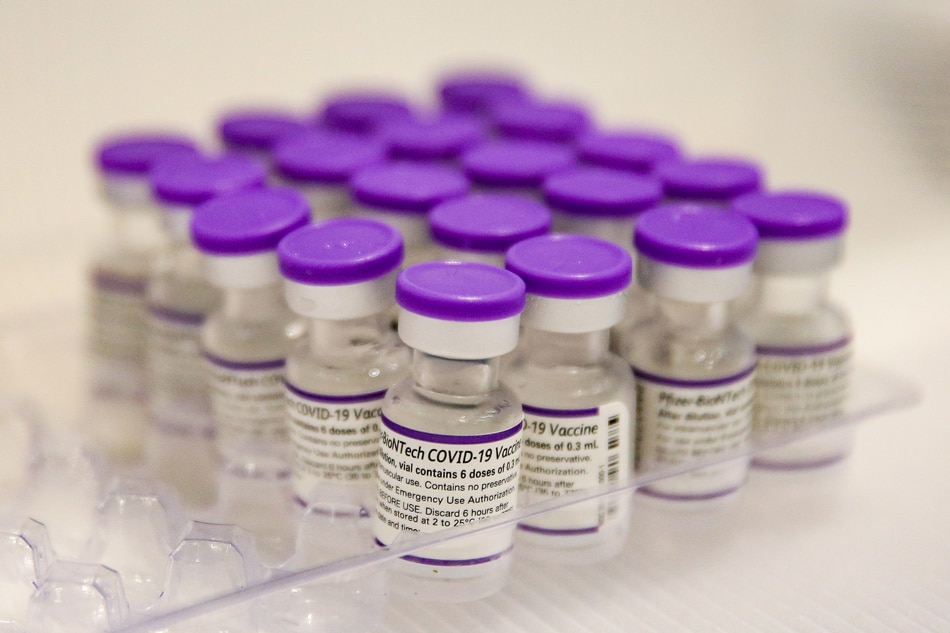DOH: First batch of bivalent COVID vaccines may arrive by end of March
ADVERTISEMENT

Welcome, Kapamilya! We use cookies to improve your browsing experience. Continuing to use this site means you agree to our use of cookies. Tell me more!
DOH: First batch of bivalent COVID vaccines may arrive by end of March
Davinci Maru,
ABS-CBN News
Published Jan 31, 2023 01:51 PM PHT
|
Updated Jan 31, 2023 02:25 PM PHT
MANILA — The Philippines' first batch of bivalent COVID-19 vaccines may arrive in the country by the end of March, the Department of Health said Tuesday.
MANILA — The Philippines' first batch of bivalent COVID-19 vaccines may arrive in the country by the end of March, the Department of Health said Tuesday.
According to DOH officer-in-charge Maria Rosario Vergeire, the vaccines will come from COVAX facility, the United Nations-backed international vaccine-sharing scheme.
According to DOH officer-in-charge Maria Rosario Vergeire, the vaccines will come from COVAX facility, the United Nations-backed international vaccine-sharing scheme.
Bivalent vaccines are modified jabs that target the omicron variant and the original form of the virus.
Bivalent vaccines are modified jabs that target the omicron variant and the original form of the virus.
"COVAX facility has already committed to us. Hopefully by the end of March, we are going to receive the COVAX vaccines already," she told ANC's "Headstart".
"COVAX facility has already committed to us. Hopefully by the end of March, we are going to receive the COVAX vaccines already," she told ANC's "Headstart".
ADVERTISEMENT
In a press briefing later Tuesday, Vergeire disclosed that a country had confirmed donation of the omicron-targeted jabs.
In a press briefing later Tuesday, Vergeire disclosed that a country had confirmed donation of the omicron-targeted jabs.
"Meron tayong isa na nag-confirm na ng kanilang commitment at ito po ay inaayos na lang natin ang delivery date nila," she said.
"Meron tayong isa na nag-confirm na ng kanilang commitment at ito po ay inaayos na lang natin ang delivery date nila," she said.
(One country has confirmed their commitment and we are just ironing out their delivery date.)
(One country has confirmed their commitment and we are just ironing out their delivery date.)
Other nations have also offered donation of bivalent vaccines, she added.
Other nations have also offered donation of bivalent vaccines, she added.
The DOH previously said it was planning to procure bivalent vaccines from Moderna and Pfizer.
The DOH previously said it was planning to procure bivalent vaccines from Moderna and Pfizer.
ADVERTISEMENT
The agency has requested a special authorization from President Ferdinand Marcos, Jr. after the state of calamity for COVID-19 expired on Dec. 31.
The agency has requested a special authorization from President Ferdinand Marcos, Jr. after the state of calamity for COVID-19 expired on Dec. 31.
While the vaccination program continues for a year using existing doses, the agency cannot procure additional jabs without special authority, Vergeire earlier said.
While the vaccination program continues for a year using existing doses, the agency cannot procure additional jabs without special authority, Vergeire earlier said.
Since the Philippines started its inoculation program in March 2021, more than 73.8 million or 94.54 percent of eligible population in the country have been fully vaccinated against COVID-19.
Since the Philippines started its inoculation program in March 2021, more than 73.8 million or 94.54 percent of eligible population in the country have been fully vaccinated against COVID-19.
Of the figure, over 21.3 million have received their first boosters while 3.8 million have gotten their second boosters.
Of the figure, over 21.3 million have received their first boosters while 3.8 million have gotten their second boosters.
To date, the country has 9,952 active COVID-19 cases.
To date, the country has 9,952 active COVID-19 cases.
Read More:
health
Department of Health
DOH
COVID-19
COVID19
coronavirus
COVID-19 vaccines
bivalent vaccines
omicron
ADVERTISEMENT
ADVERTISEMENT



